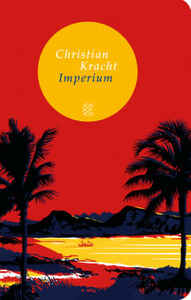You need to sign in or sign up before continuing.
Take a photo of a barcode or cover
I wanted to like this a lot but there just wasn't much there, I mean there was no plot to speak of, and I guess that was my issue with it. August Engelhardt was certainly an interesting person, ahead of his time really (vegetarian, health nut, obsessed with coconuts), but this vaguely-connected series of anecdotes really didn't do it for me. I think I'd prefer an out and out biography rather than a diary that traipsed from one event to another.
The writing, however, was very strong--although the translator seemed to rely heavily on the thesaurus (I presume; however, cover blurbs from both Knausgaard and Herta Muller suggest a wordy original, too).
The writing, however, was very strong--although the translator seemed to rely heavily on the thesaurus (I presume; however, cover blurbs from both Knausgaard and Herta Muller suggest a wordy original, too).
I haven't slept in two days. I'm trying to read to get sleepy. I'm hypomanic and very easily irritated. With that said, I got 2% in, decided there are too many f'ing commas, and moved on with my life.
É um livro bem escrito, com alguma imaginação, em tom satírico (faz lembrar um pouco o Candide, de Voltaire).
Conta a história de um cidadão alemão que pretende formar uma seita adoradora de cocos e sol numas ilhas do Pacífico, protectorado alemão.
É um livro curto e também inconsequente e julgo que não me vai ficar na memória durante muito tempo.
Conta a história de um cidadão alemão que pretende formar uma seita adoradora de cocos e sol numas ilhas do Pacífico, protectorado alemão.
É um livro curto e também inconsequente e julgo que não me vai ficar na memória durante muito tempo.
Set in the early 1900s, Imperium is reminiscent of the classic, seafaring adventure novels, but with a heavy dose of outlandishness and the bizarre.
Author Christian Kracht, a Swiss writer and journalist, centers the story around his fictitious character, August Engelhardt, an eccentric German who abandons his home country to build a nudist colony on an island in German New Guinea. He strives to be a full-blown “cocovore,” a term used to describe someone sustained only by coconuts. It’s an obsession that triggers Engelhardt’s swift descent into madness.
Coupled with Kracht’s beautifully poetic descriptions, the plot’s absurdity gives Imperium humorous elements, although it is far from a laugh-out-loud read (for me at least). Instead, I personally found it to be a satirical examination of human nature and society, focusing primarily on dramatic dualities and contradictions.
For instance, both World War I and II span the story’s timeline, so Germany in this era can easily represent one of the most extreme examples of how horrifying “civilized” society can become. Engelhardt seeks to escape this reality by creating his very own radical society, but on the opposite end of the spectrum: relying entirely on the simple yet utilitarian coconut, secluded in near-total isolation.
Ultimately, neither of these societies can succeed in the long term, but there are lessons to be learned nonetheless. I’m reminded of the well-known saying, “Those who cannot remember the past are condemned to repeat it.” Kracht takes the concept one step further beyond remembrance to action, “…of what use to anyone is escape if one does not return to apply what has been learned and experienced?”
Adventure and escapism are welcome, but how can we expect to better society and ourselves if we remain in seclusion, unable to share what we’ve learned? Even Thoreau, who is praised by Engelhardt, returned to society and wrote of his self-reliance and minimalist lifestyle in nature—even his isolation was temporary.
A pure utopia and a total escape from mankind is therefore unattainable, at least in this story, no matter how idealistic and well-intentioned one’s fantasies are. Perhaps there is a common thread—a collective unconscious—holding all of us together, for better or worse. Yet, from a much larger perspective, humanity is but a miniscule blip within the infinite history of space and time:
“He understands why he as an individual may be a part of everything, but is still, in the totality of things, more negligible than a little chunk of coral that over millions of years is ground into ephemeral sand on the upmost periphery of cosmic perception.”
TL;DR: Imperium is a relatively short novel, but packed with powerful language and metaphor. While I enjoyed several elements of this novel, it didn't blow me away overall, so I gave it a rating of 3.5 stars out of 5. However, if you’re seeking a poolside book with some literary depth this summer, Imperium is an intriguing read.
Author Christian Kracht, a Swiss writer and journalist, centers the story around his fictitious character, August Engelhardt, an eccentric German who abandons his home country to build a nudist colony on an island in German New Guinea. He strives to be a full-blown “cocovore,” a term used to describe someone sustained only by coconuts. It’s an obsession that triggers Engelhardt’s swift descent into madness.
Coupled with Kracht’s beautifully poetic descriptions, the plot’s absurdity gives Imperium humorous elements, although it is far from a laugh-out-loud read (for me at least). Instead, I personally found it to be a satirical examination of human nature and society, focusing primarily on dramatic dualities and contradictions.
For instance, both World War I and II span the story’s timeline, so Germany in this era can easily represent one of the most extreme examples of how horrifying “civilized” society can become. Engelhardt seeks to escape this reality by creating his very own radical society, but on the opposite end of the spectrum: relying entirely on the simple yet utilitarian coconut, secluded in near-total isolation.
Ultimately, neither of these societies can succeed in the long term, but there are lessons to be learned nonetheless. I’m reminded of the well-known saying, “Those who cannot remember the past are condemned to repeat it.” Kracht takes the concept one step further beyond remembrance to action, “…of what use to anyone is escape if one does not return to apply what has been learned and experienced?”
Adventure and escapism are welcome, but how can we expect to better society and ourselves if we remain in seclusion, unable to share what we’ve learned? Even Thoreau, who is praised by Engelhardt, returned to society and wrote of his self-reliance and minimalist lifestyle in nature—even his isolation was temporary.
A pure utopia and a total escape from mankind is therefore unattainable, at least in this story, no matter how idealistic and well-intentioned one’s fantasies are. Perhaps there is a common thread—a collective unconscious—holding all of us together, for better or worse. Yet, from a much larger perspective, humanity is but a miniscule blip within the infinite history of space and time:
“He understands why he as an individual may be a part of everything, but is still, in the totality of things, more negligible than a little chunk of coral that over millions of years is ground into ephemeral sand on the upmost periphery of cosmic perception.”
TL;DR: Imperium is a relatively short novel, but packed with powerful language and metaphor. While I enjoyed several elements of this novel, it didn't blow me away overall, so I gave it a rating of 3.5 stars out of 5. However, if you’re seeking a poolside book with some literary depth this summer, Imperium is an intriguing read.
Hat mich erst ab der Hälfte wirklich gepackt, dann war's super.
adventurous
challenging
dark
funny
lighthearted
medium-paced
Plot or Character Driven:
Character
Strong character development:
No
Loveable characters:
No
Diverse cast of characters:
No
Flaws of characters a main focus:
Yes
Noch genau so eindrücklich wie beim ersten Mal lesen - vielleicht sogar noch mehr.
Eine Art Anti-Robinson Crusoe und deshalb viel glaubhafter. Ein Aussteiger mit einem Traum, für den er alles gibt.
Krachts Sprache ist hier äusserst literarisch; manche meinen, unleserlich, aber das empfand ich weder damals noch heute so. Ein krasser Gegensatz zu "Faserland", das ich zu Beginn des Monats gelesen habe, sodass man die Entwicklung Krachts mühelos beurteilen kann.
Eine Art Anti-Robinson Crusoe und deshalb viel glaubhafter. Ein Aussteiger mit einem Traum, für den er alles gibt.
Krachts Sprache ist hier äusserst literarisch; manche meinen, unleserlich, aber das empfand ich weder damals noch heute so. Ein krasser Gegensatz zu "Faserland", das ich zu Beginn des Monats gelesen habe, sodass man die Entwicklung Krachts mühelos beurteilen kann.
4 Stars // Ze Germans at their Wurst
I’ll admit: I chose this book purely by its beautiful cover art. In the end, I came away from this short adventure rather well entertained and impressed by the authors rich language, intrigued to read more by Christian Kracht.
It’s the prose first and foremost that shapes the character of this novel: Intricate, complex sentences paint some beautiful and rich pictures in front of your inner eye. Sometimes the prose is so convoluted though that you have to read the paragraphs a few times to truly grasp the amount of content within. Nevertheless, I have rarely read a book written in such a dense and rich language. The closest I can think of would be Perfume by Patrick Süskind, which also has a similarly poetic prose - just easier to digest. I would therefor highly recommend reading Imperium in Germany, if you are able to do so.
The story itself then is a rather dark and ironic take on the state of the German oversea colonies in the beginning of the 20th century. The novel is not laugh-out-loud funny, but rather subtle in its sarcastic undertone, thereby calling out the perverse cultural appropriation and political insanity we saw at the time. You won’t find many likeable characters in this book - which is the point by the way - but rather a bunch of unfathomable idiots, who desperately try to make things work.
All in all Imperium is a short, dense and mildly entertaining read that had a great graphic designer at work.
I’ll admit: I chose this book purely by its beautiful cover art. In the end, I came away from this short adventure rather well entertained and impressed by the authors rich language, intrigued to read more by Christian Kracht.
It’s the prose first and foremost that shapes the character of this novel: Intricate, complex sentences paint some beautiful and rich pictures in front of your inner eye. Sometimes the prose is so convoluted though that you have to read the paragraphs a few times to truly grasp the amount of content within. Nevertheless, I have rarely read a book written in such a dense and rich language. The closest I can think of would be Perfume by Patrick Süskind, which also has a similarly poetic prose - just easier to digest. I would therefor highly recommend reading Imperium in Germany, if you are able to do so.
The story itself then is a rather dark and ironic take on the state of the German oversea colonies in the beginning of the 20th century. The novel is not laugh-out-loud funny, but rather subtle in its sarcastic undertone, thereby calling out the perverse cultural appropriation and political insanity we saw at the time. You won’t find many likeable characters in this book - which is the point by the way - but rather a bunch of unfathomable idiots, who desperately try to make things work.
All in all Imperium is a short, dense and mildly entertaining read that had a great graphic designer at work.
dark
reflective
medium-paced
Plot or Character Driven:
A mix
Strong character development:
Yes
Loveable characters:
Complicated
Diverse cast of characters:
Yes
Flaws of characters a main focus:
Yes





